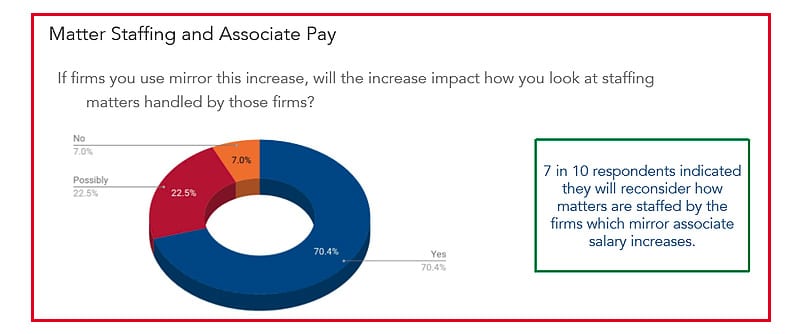
The Corporate Legal Operations Consortium (“CLOC”) published a flash surveyin June that showed in-house counsel reaction to certain Big Law firms raising starting salaries for associates to $190k. With such a strong negative reaction – it makes you wonder if law firms have a strategy to counter these reactions when clients bring it up in pitch meetings.
Regardless of the service you sell, when 70% of the reaction is negative, it should make you stop and think not only why you did it – but how are you going to arm your lawyers with talking points on how to address this concern.

Impact on rates?
Go to the website of any Big Law firm that pays these salaries to lawyers coming right out of law school and you will read a bio for them that says something like…. “John/Jane Doe is a first year associate at (insert firm’s name) where he/she practices in our (fill in the blank) practice.” How can they justify charging several hundred dollars an hour for them when they can’t even describe what expertise they bring to the client in their bio beyond one generic sentence?
Corporate Counsel understand the free market when it comes to associate salaries – it’s just that they don’t want the cost passed on to the them. As one survey respondent noted:
“As long as it does not change the rates I am charged, they are free to overpay whomever they like.”
It’s up to the law firm to either convince the client the pay increase will not be passed on to them, or more importantly communicate to the client a broader strategy on how you plan to staff and price the matter that alleviates any concerns.
Great news for alternative legal providers
This is only going to further incentivize people in legal operations and legal procurement to look closer at alternative legal providers – as 70% of the respondents agreed with that assessment. If I was a vendor for an Alternative Legal Service Provider (“ALSP”), this is a great hook to grab a corporate counsel’s ear.

The other option – which I’ve been seeing more and more, is for clients to just simply drop a sentence in the outside counsel guidelines for preferred providers that say they will not pay for any first year associates to be staffed on any matters. It’s up to the law firm to prove to the client why this staffing strategy is in the company’s best interest.
As one respondent confirmed:
“This will just further drive segmentation. It will cause us to adjust how we staff matters. It won’t cause us to discontinue using these firms, but it will cause us to accelerate segmenting part of the work to more efficient firms and/or alternative legal services providers.”
Law firms need to be able to communicate their staffing strategies.
One of the questions we are seeing more frequently in RFPs is and asking for law firms to describe examples where they have used creative staffing strategies to provide more value for the client. Smart law firms will use this as a competitive advantage in today’s market and identify good examples to share. The generic answer of “we staff based on our clien’ts preferences” shows a lack of proactive strategic thought by the law firm.

What does data say?
Has any law firms ever researched which associate hires turn out to be the most PROFITABLE for the law firm? Meaning, are these associates they are chasing in the market to give them $190k on day 1, do we have data that supports that those hires turn out to be the most profitable partners? Because I’ve spent nearly 20 years working with lawyers, and from my perspective, how sought after the associate was coming out of law school rarely was tied to the most successful law practices. The lawyers who had the biggest books of business typically had a well-rounded mix of legal smarts and business skills and a high level of client service.
Insight, Experience, Results
Trust RFP Advisory Group to manage your RFP and ensure that you get optimal value for your dollar. Contact us today.
